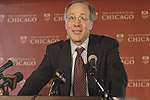Chicago In the News
The Chronicle’s biweekly column Chicago In the News offers a digest of commentary and quotations by a few of the University faculty members, students and alumni who have been headlining the news in recent weeks. Chicago faculty members are some of the most frequently quoted experts, so space allows publishing references to only selected examples. To read many of the full newspaper articles mentioned in this column, visit the University News Office Web site: http://news.uchicago.edu.
 Roger Myerson |
|
Q&A with future Treasury secretary
Roger Myerson, the Glen A. Lloyd Distinguished Service Professor in Economics and the College, was one of seven experts to submit questions for Timothy Geithner, President Obama’s newly approved Treasury Secretary, in the Wednesday, Jan. 21 op-ed page of The New York Times. Myerson, the 2007 Nobel Memorial Prize in Economics winner, asked, “Are financial regulatory reforms necessary now to restore investors’ confidence and revive our economy? Should debt securities that are held by regulated banks and pension funds be rated by multiple independent credit reports that have been commissioned by a federal agency, or should we continue to let the issuers of debts decide who will rate their risks? Should large financial institutions incur higher reserve requirements and other regulatory penalties when they become ‘too big to fail?’”
Message of hope hangs around
The increasing abundance of Obama memorabilia being displayed in homes was the subject of an article in the Saturday, Jan. 17 Los Angeles Times. With family’s desires to display images that have meaning, such as children or other heroes—it’s a trend the author likens to the 1960s, when many baby-boomer Catholics hung pictures in their homes of John F. Kennedy. W.J.T. Mitchell, the Gaylord Donnelley Distinguished Service Professor in English Language & Literature and Art History, said of Obama: “He has said, ‘I understand that I am an image that a lot of hopes are projected onto.’ At the level of an icon, he personifies the collective hopes of a vast multitude of people.”
Secrets to successful meetings
Reid Hastie, the Robert S. Hamada Professor of Behavioral Science at Chicago Booth, wrote an opinion piece that was published in the Sunday, Jan. 18 New York Times. Hastie called for efficiency and explicitness in business meetings. “The main reason we don’t make meetings more productive is that we don’t value our time properly,” he writes. “The leader seems to hope that magic will occur, producing a serendipitous solution to some of the problems addressed.” To improve this problem, Hastie argues for explicit directions about the meeting’s objectives, an analysis of opportunity cost (time lost) and the assigning of blame or credit based on a meeting’s success.
Why can’t an ant get hurt?
“Why don’t ants die when falling from a high distance?” Michael LaBarbera, Professor in Organismal Biology & Anatomy and the College, answered the question in the Monday, Jan. 12 Globe and Mail. Ants can survive such situations because they have so little mass relative to their air resistance, so they fall slowly, and their bodies are well designed to absorb blows. In comparison, an ant is traveling 4 miles per hour when it hits the ground, about one-30th times slower than a human. “Sufficiently small animals cannot be hurt in a fall from any height: A monkey is too big, a squirrel is on the edge, but a mouse is completely safe,” LaBarbera said.
 Eric Posner |
|
Is bailout plan unconstitutional?
Eric Posner, the Kirkland & Ellis Professor in the Law School, weighed in on the constitutionality of the $700 billion federal bailout plan in a Friday, Jan. 16 article in The New York Times. Some conservatives argue that the law creating the program violates principles that limit the power delegated to the Executive Branch, especially since the plan’s original focus has grown to include other bailouts, such as the auto industry. Yet Posner said he “would be extremely surprised” if a challenge was upheld, “even with this court” of conservative justices, given 70 years of jurisprudence since Congressional delegation was weakened during the New Deal.
Saying and doing are different
Eugene Caruso, Assistant Professor of Behavioral Science at Chicago Booth, led studies that examined the social price a person pays for stereotyping. This so-called “stereotype tax” was quantified based on questions about the perception of weight and gender. In one study, students were asked to pick partners for a trivia question, and although they reportedly did not care about weight, their real answers revealed they would trade 11 IQ points for a thinner teammate. In the other study, subjects’ preference in the sex of their boss revealed they were willing to pay a 22 percent tax on their salary to have a male superior. The study was featured in the Thursday, Jan. 15 Economist.
MRSA cases rising quickly
Robert Daum, Professor of Infectious Diseases in Pediatrics, calls the alarming increase in children’s ear, nose and throat infections caused by drug-resistant staph germs “a major public health problem” in a Tuesday, Jan. 20 story on the Associated Press news wires. A study of 21,009 pediatric head-and-neck infections, which were caused by staph germs from 2001 to 2006, showed that the percentage caused by MRSA bacteria doubled from 12 percent to almost 28 percent. MRSA, or methicillin-resistant Staphylococcus aureus, can cause dangerous, life-threatening infections. Researchers found that almost 60 percent of infections documented in the study were believed to have been contracted outside a hospital setting.
![[Chronicle]](/images/sidebar_header_oct06.gif)